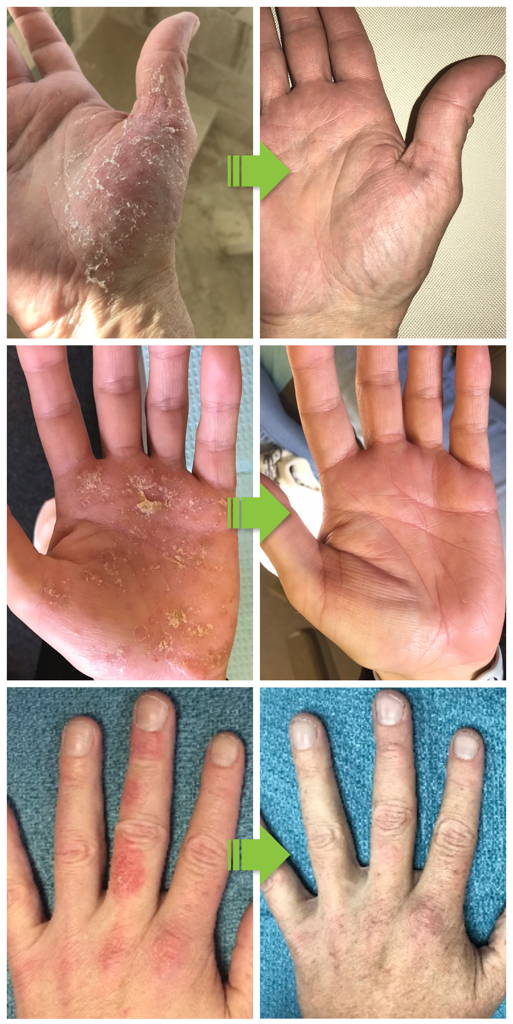WELLNESS IS TRENDING
End Eczema Flare-Ups & Say Goodbye to Itching, Dryness, & Discomfort!
Published 14 March 2025
Eczema is one of the most common skin conditions in the United States, affecting millions of Americans.
Despite its prevalence, eczema can be difficult to treat, leaving sufferers with dry, itchy, and inflamed skin that can impact their daily lives and self-esteem.
For too long, eczema sufferers have had to rely on creams and ointments that provide little to no relief, and can even make symptoms worse.
But does that mean that eczema sufferers should suffer in silence and accept their fate? Absolutely not.
Keep reading this report if you want to know how to put these struggles behind you using a scientifically proven solution made in the USA…
Plus, why this solution is highly sought after by those struggling with eczema, including A-list celebrities and individuals who demand the best for their skin.
Life Changing Results From Customers

What people are saying:

Experience Skin Care That Works!
A scientific study by Dr. John Swierzewski, DPM, a lifelong eczema patient, has shown that a formulation of a specific pH is the only way to realign and naturally hydrate the skin.

Since then, Dr. John has dedicated himself to creating Eczema Wipes that mirror this pH level and help eczema and psoriasis patients put their skin issues behind them. As a podiatrist, he also observed that the pH wipes could assist his patients with foot fungus and diabetic sores.
Say hello to Eczema Flare Wipes®, the all-natural, steroid-free solution made in the USA that effectively manages eczema symptoms. Using our wipes can provide you with a variety of benefits, such as:
- Soothes inflammation and itching caused by eczema flares
- Protects your skin barrier and prevents future flares
- Refreshes dry, cracked, and flaky skin
- Prevents eczema from spreading to other areas
Disclaimer: This site is not a part of the Facebook website or Facebook Inc. Additionally, This site is NOT endorsed by Facebook in any way. FACEBOOK is a trademark of FACEBOOK, Inc.
Representations regarding the efficacy and safety of Eczema Flare Wipes® have not been evaluated by the Food and Drug Administration. The FDA only evaluates foods and drugs, not health care products like these. They are not intended to diagnose, prevent, treat, or cure any disease. This information does not constitute medical advice and it should not be relied upon as such. Consult with your doctor before modifying your regular medical regime.
Scientific REFERENCES: 1. Kenichiro Chikakane, MD, Hisashi Takahashi, MD, PhDMeasurement of skin pH and its significance in cutaneous diseases, Clin in Dermatology.VOLUME 13, ISSUE 4, P299-306, JULY, 1995Clinics in Dermatology 2. Hans Christian Korting, MD, Otto Braun-Falco, MDThe effect of detergents on skin pH and its consequencesVOLUME 14, ISSUE 1, P23-27, JANUARY 01, 1996International Academy of Cosmetic Dermatology 3. F. BREIDT, JR., J. S. HAYES, AND R. F. MCFEETERSIndependent Effects of Acetic Acid and pH on Survival of Escherichia coli in Simulated Acidified Pickle Prod Jrnl of Food Protection, Vol. 67, No. 1, 2004, Pages 12–18 4. Alakomi, H. L., E. Dkytta, M. Saarela, T. Mattila-Sandholm, K. Latva-Kala, and I. M. Helander. 2000. Lactic acid permeabilizes Gram negative bacteria by disrupting the outer membrane. Appl. Environ. Microbiol. 66:2001–2005. 5. Breidt, F., J. S. Hayes, and H. P. Fleming. 2000. Reduction of microflora of whole pickling cucumbers by blanching. J. Food Sci. 65:1354–1358. 6. Brudzinski, L., and M. A. Harrison. 1998. Influence of incubation conditions on survival and acid tolerance response of Escherichiacoli O157:H7 and non-O157:H7 isolates exposed to acetic acid. J.Food Prot. 61:542–546. 7. Castanie-Cornet, M.-P., T. A. Penfound, D. Smith, J. F. Elliott, andJ. W. Foster. 1999. Control of acid resistance in Escherichia coli. J.Bacteriol. 181:3525–3535. 8. Diez-Gonzalez, F., and J. B. Russell. 1997. The ability of Escherichiacoli O157:H7 to decrease its intracellular pH and resist the toxicity 9. Mayerhauser, C. M. 2001. Survival of enterohemorrhagic Escherichia coli O157:H7 in retail mustard. J. Food Prot. 64:783–787. 10. McKellar, R. C., and K. P. Knight. 1999. Growth and survival ofvarious strains of enterohemorrhagic Escherichia coli in hydrochloric and acetic acid. J. Food Prot. 62:1462–1469.